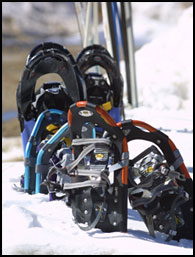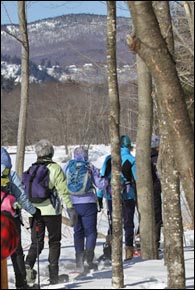| |
|
 The beauty of snowshoeing
is that it's easy to learn. The beauty of snowshoeing
is that it's easy to learn.
A trip on snowshoes
may be as easy as a casual walk around the yard or as difficult
as a winter mountain hike. No special skills and only warm winter
clothing is required. One of the finest aspects of snowshoeing
is its simplicity. The great thing
about snowshoeing is you can snowshoe the same trails you hike in the
summer. The banks of streams and rivers are always interesting with their
open views and potential for seeing wildlife. Start with shorter hikes
and work your way up to longer hikes to the peaks. Be sure to check our
snow report for trails particularly suited to snowshoeing.
What follows here is a few or our recommendations
for making your introduction to snowshoeing an easy and rewarding
experience. |
|
Before
you leave, be sure you are
prepared with...
Pack or Fanny Pack
Guidebook
Map and Compass
Flashlight or Headlamp
Dry Matches
Lunch or Snack Food
Sunscreen & Sunglasses
Water or Hot Drink
Extra Hat, Gloves and Socks
Whistle, Knife and
Nylon Cord
Have a safe day. |
 What
to Wear ... What
to Wear ... - Footwear: This
is where it all begins. Warm, waterproof footwear is very important.
Try to find footwear that is warm, provides ankle support and is
flexible enough to allow comfort and mobility for your feet. Gaiters
are a definite plus. Besides keeping the snow out of your boots,
they will waterproof your legs below the knees.
Top
and Bottom: Lightweight breathable
synthetic or wool underwear covered with insulating layers of warm
sweaters or fleece clothing topped off with windproof, water repellent
or waterproof-breathable clothing is the ideal arrangement for snowshoeing.
If you are too warm, stop snowshoeing and take off extra layers. Too
cool, reverse the process. Maintain your comfort level, don't allow
yourself to become too hot or too cold
Equipment: Snowshoes
generally fall into two general categories, "traditional" snowshoes
and "sport" (or western) snowshoes. -
The first
decision one should consider is size. You will want
to select the smallest and lightest weight snowshoe
that will provide the best flotation in the type of
snow and terrain you'll be traveling in. Traditional
shoes are made of wood and will require frame and binding
maintenance. The newer sport snowshoes are made of
aluminum, rubber, plastic and other lightweight materials
that are durable, require no maintenance, and are easy
to use. Click HERE for more information about what type of snowshoe
is right for you!
-
 Snowshoe
Technique ... Snowshoe
Technique ...
- Snowshoeing
is basically walking with big feet, you just strap on the snowshoes
and walk away. When starting out for the first time on snowshoes
try a flat trail until you are comfortable with tackling steeper
terrain. Depending on the snow, dry or powdery, wet, hard or slippery,
the snow will move. The footing will feel inconsistent. Walk gently,
take shorter strides, don't lunge, or leap from step to step. Click
HERE for illustrations.
 Snowshoe
Don'ts! ... Snowshoe
Don'ts! ... - We don't all have
to learn the hard way!
You'll benefit by our experiences if you follow these basics ...
Never
step on a moving snowshoe: If you step
on
the rear of your forward snowshoe with your forward-moving snowshoe, you will
almost always plant your face in a nose dive!
Never back up. Snowshoes
do not back up well. Frequently, if you step back, your snowshoe tails
will drive down into the snow usually causing a fall. Instead of backing
up use small U-turns or step turns to change directions.
Avoid
traversing slopes. Snowshoes
are not well designed to grip with their sides. Traverse at an angle
up or down but not straight across if possible.
|
|


 The beauty of snowshoeing
is that it's easy to learn.
The beauty of snowshoeing
is that it's easy to learn.